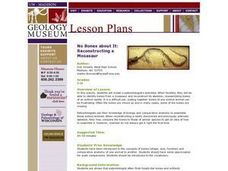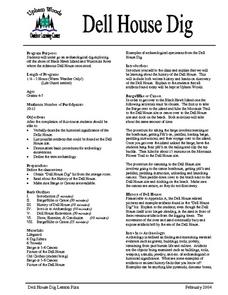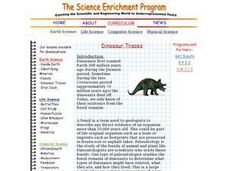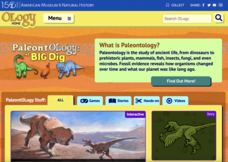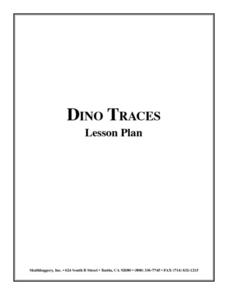Curated OER
Dig This: A Relief Sculpture of Dinosaur Bones
This is a truly amazing project. Perfect to use during your next dinosaur unit. Second and fifth graders work together to draw and make a relief sculpture of a nine foot-long stegosaurus. They discuss what paleontologists do and then...
Curated OER
Introduce Vocabulary: Dinosaur Bones (Barner)
Dig into some prehistoric vocabulary in Bob Barner's informative book Dinosaur Bones. This works best if you introduce the primitive words before reading the story. These are the focus terms in the text: ancient, climate, extinct,...
Curated OER
Digging For Dinosaurs
In this dinosaur themed instructional activity, students work together as a team of paleontologists to draw the dinosaur bones they discovered at a dig site. They must label their drawing on a grid map and then provide data about the...
Curated OER
CyberHunt: Digging for Dinosaurs
Students discover dinosaur facts using internet research. In this 2nd - 3rd grade lesson plan, students identify various dinosaur facts. Students use internet research to answer questions regarding dinosaurs.
Curated OER
Dig This Dinosaur Relief Lesson
Students create low-fire ceramic relief sculptures of dinosaur bones. They incorporate art history, aesthetics, and criticism with hands on activity. Students work together to draw an enlarged skeleton on butcher paper. The Stegosaurus...
Curated OER
Bringing Dinosaurs Back to Life
Students explain how the earth makes fossils and how dinosaur remains become fossils. In this Bringing Dinosaurs Back to Life lesson, students solve paleo-puzzles which ask students to solve problems as if they were paleontologists....
Curated OER
Dinosaurs
Students participate in a simulated archeological dig to gain an understanding of the earth's development as well as the organisms on it. For this dinosaur lesson plan, students work in small groups removing five pieces from the 'dig'...
Curated OER
Fabulous Fossils
Students investigate how fossils are formed. They read the book, "Digging Up Dinosaurs," examine fossil samples, create a fossil imprint using play-doh, and complete a Fossil Questionnaire activity sheet.
American Museum of Natural History
Talk to a Titanosaur
Learn all about the Titanosaur with an engaging website that delves deep into the large reptile's physical traits, family history, discovery, and fossil reconstruction.
Curated OER
No bones About It -A Mosasaur
Students model a paleontologist's activities. They identify dinosaur bones and reassemble them into a skeleton of an extinct reptile.
Curated OER
Dell House Dig
Pupils experience an archaeological dig exploring off the shore of Black Hawk Island and Wisconsin River. They study in the same place where the infamous Dell House once stood. Dell House and its historical significance is reviewed...
Curated OER
DinoWorks
DinoWorks is a paleontolgy kit that you can order from skullduggery.com. This resource has directions that come with it. Primary paleontolgists examine bone replicas of the Velociraptor, Tyrannosaurus, and Triceratops that you prepare...
Howard Hughes Medical Institute
Using the Scientific Process to Study Human Evolution
Did humans and dinosaurs coexist? How do we know? Scholars dig in to the tools and methods researchers used to study the process of human evolution by watching a slideshow with embedded video clips. Pupils learn the importance of asking...
Curated OER
Where Have All the Dinosaurs Gone?
First graders listen to and discuss Patrick's Dinosaurs by Carol Carrick. They have a pretend dinosaur dig using dog biscuits and chicken bones. Students discuss how fossils are formed and make reproductions of them. After discussing the...
Curated OER
Excavation Dig
Students engage in a role-play of a dinosaur excavation dig. They dig through sand to locate buried bones and then discuss the ethics of destroying buildings and other property to get at the fossil remains.
Curated OER
Dinosaur Traces
Students identify and interpret the type of evidence found at a typical dinosaur dig and mimic a paleontologist by taking crayon rubbings of simulated bone impressions. After the rubbings are taken, the students reconstruct the complete...
Curated OER
Theme: Dinosaurs
Pupils identify at least ten different dinosaurs and name them. Students explain the difference between plant-eating dinosaurs and meat-eating dinosaurs. Pupils explain how scientists know about dinosaurs.
Curated OER
Dinosaur I Finding And Dating
Students investigate how long dinosaurs lived on Earth and how that compare to how long man has been on Earth. They discover how scientists excavate fossils.
American Museum of Natural History
Anatomy Adventure
Sometimes science is puzzling. Using an online animation, individuals manipulate skeletal bones of an ancient species to recreate its skeleton. Learners complete the skeletal puzzle and learn about the process of paleontology in person...
Curated OER
Common and Science Names
First graders investigate how dinosaurs are named. They listen to the book "The Littlest Dinosaurs," discuss Greek and Latin words and word parts, identify the word parts and meanings of Triceratops, and create a drawing of a dinosaur...
Curated OER
Dig This
Fifth graders explore the work of paleontologists and the life of dinosaurs and create a sculpture of the bones of a Stegosaurus. The sculpture was then buried and used by other classes for a dig.
Curated OER
LESSON PLANS (print version) pdf What is a Fossil?
Students can better explain how mould and cast fossils occur when they make their own cast fossils using plaster of Paris and objects such as shells, bone or even their own hand or footprint.
American Museum of Natural History
Layer of Time
Dig through the layers for a better understanding of fossils. Scholars learn that fossils form in layers of sedimentary rock. Pupils arrange virtual layers to show the fossil record of different species. Once the layers are correct, they...
Curated OER
Dino Traces
Students are introduced to the type of evidence that is found at a typical dinosaur dig. They create rubbing casts of bone impressions on paper and, using bones, identify dinosaurs.











